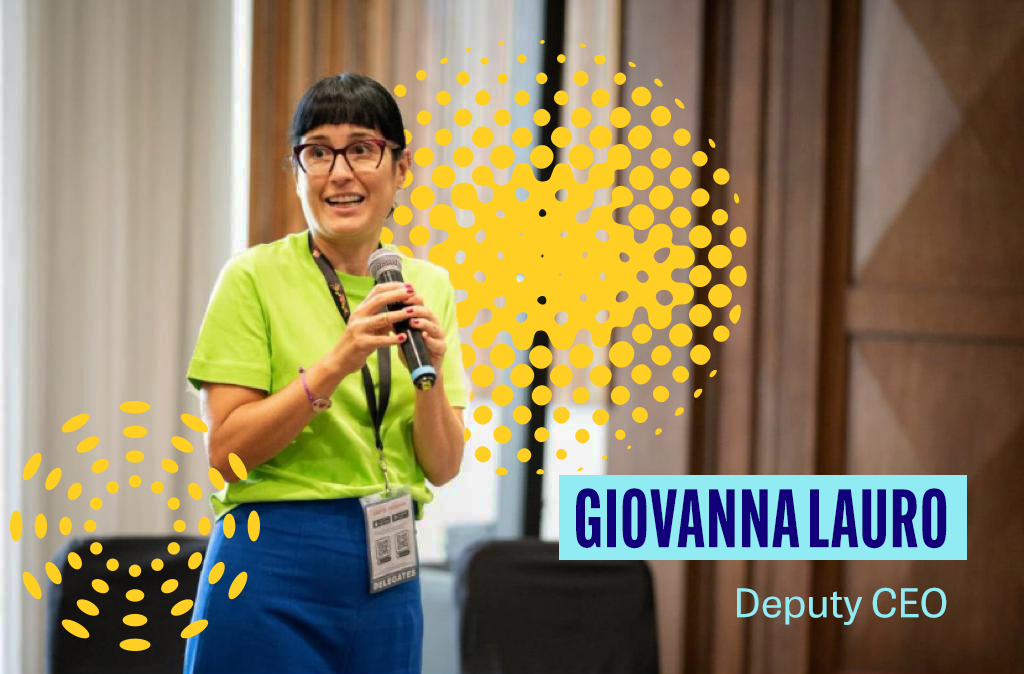Equimundo is excited to announce that Giovanna Lauro, formerly Equimundo’s Vice President of Programs and Research, has now become Equimundo’s Deputy CEO. Giovanna will continue to work alongside Gary Barker, Equimundo’s President and CEO, to steward our research, programs and advocacy efforts.
Read our interview with Giovanna below to learn more about her career journey and her new role, and please join us on congratulating her on this exciting transition!
What has led you to this moment in your career?
I started my career as a public health specialist and feminist activist working on adolescent girls’ sexual and reproductive health and rights, an issue which I still deeply care about. I was exposed to a lot of really inspiring work focused directly on women and girls, and it is essential that this work continue to expand. But I was also frustrated by parts of the international development discourse that disproportionately put the burden for change on women and girls, or that created safe spaces for girls without simultaneously investing in changing the boys and men around them. Educating girls is hugely important for development – and so is working with boys to create and sustain new, more egalitarian, norms. Promoting women’s leadership is crucial and one of the steepest battles ahead of us, and so is getting men to embrace caregiving in their private and professional lives. As a woman who enjoys the fruits of the feminist revolution, that is the big question I feel I must grapple with at this moment in my career: “How do we engage men to support women’s equal leadership? How do we engage men and boys to do their share of the care work at home?” I think that’s the other revolution we have to have – in men’s lives – to fully achieve gender equality.
What motivates you to work in the field of gender equality and social justice?
Growing up in Italy in a matriarchal family, I had the privilege of looking up at highly educated female role models who also supported my education unconditionally throughout the years. Yet, I also saw firsthand the toll that having to do everything on their own took on these amazing women – the double burden of balancing paid work and unpaid care, the legacy of undisclosed abuse, and the addictive behaviors to cope with the silence and stigma around experiencing violence at home in a patriarchal society.
Because of this, I have always been aware that, while girls can be supported in their everyday lives through education and “empowered” as individuals, our lives are lived as part of families, communities and societies – and we cannot achieve long-term sustainable justice and wellbeing without changing the broader social systems and dynamics of power in which we live. Because of the privilege I had growing up, and the intergenerational trauma I carry, it is my duty and passion to do my share to build a more equitable world.
What are you most looking forward to about taking on this new position? What inspires you about Equimundo?
Even though the current global political context may seem bleak, undeniable progress has been made around increasing the acceptance of women’s roles beyond being solely caregivers, engaging in behaviors and professions traditionally associated with men. Yet, there is still so much to be done to get men to embrace healthier ideas of masculinity, including normalizing traits such as being caring, supportive, empathetic, and connected.
Working for Equimundo is a unique opportunity to push for this revolution in men’s and boys’ lives, which in turn is a crucial step in continuing the feminist revolution. As an activist that stems from the feminist movement itself, I am thrilled to be in this senior position at a male allyship organization, helping to steward our research, programs and advocacy to continue our accountability to the women’s rights and other social justice movements.
What excites you most about the new directions we move in as Equimundo?
One of the initiatives I am most thrilled about is the Global Boyhood Initiative, which Equimundo coordinates and that aims to change the ways in which we raise boys to promote gender equality. This is because one thing we can all do to change the roots of healthy manhood is talking to the boys in our lives from the earliest ages onward. As caregivers, teachers, coaches, we can talk to boys about what we believe is a healthy way to be men: caring and connected, speaking up when we see other people use violence. We need to be clear that being a man is about being caring and empathetic as much as it is about being competitive and being prepared to be in the workplace.
I’m also excited by our ongoing work around gender transformative parenting programs, including the recent six-year follow up of the Bandebereho program in Rwanda that shows sustained impact working with couples across multiple domains – such as intimate partner violence reduction, improved parenting behaviors, men’s increased participation in care work, and improved mental health outcomes for men and women. These are truly radical and transforming results, that show that change is not only possible but also sustainable over time.
